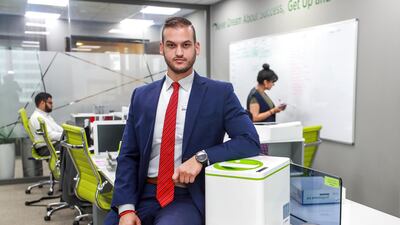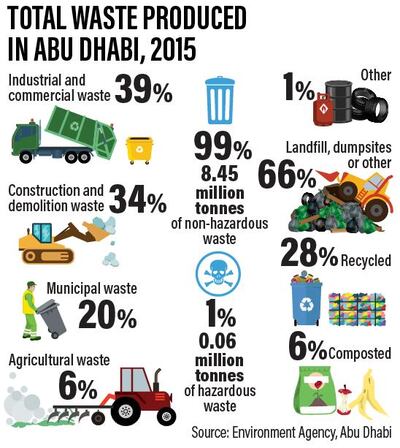Charbel Maalouf, a civil engineer and environmental researcher, doesn’t mind getting his hands dirty—literally. His startup is developing technology to eliminate garbage ranging from food scraps to horse litter to achieve zero-waste in Abu Dhabi by 2020.
Abu Dhabi-based Sustainable Environmental Technologies, established in 2016, is working to reduce the amount of waste that reaches landfills through machines that eliminate it onsite at homes, businesses or industrial spaces.
“It’s terrible, if you go to the landfills, there’s a huge smell from food waste and it takes 90 days to decompost because it’s hot and in the process it emits harmful methane gas,” Mr Maalouf, managing director of SET, said. “If you divert food waste from landfills and treat it on the premises, then its happy days.”
The UAE was last on a list of 34 countries ranked on food waste by the 2017 Food Sustainability Index compiled by The Economist Intelligence Unit and the Barilla Center for Food and Nutrition. Abu Dhabi alone produced 8.48 tons of solid waste a year or more than 23,000 tons a day, according to the latest Abu Dhabi State of Environment Report 2017. Waste in the emirate is expected to increase as the population swells and the economy grows, the report said.
SET’s SmartCara series of food composting machines turn organic waste into rich “soil amendment” in about four hours, which can be used in gardening or even fed to pets. The bigger Reddonatura machines convert waste from commercial and industrial customers with a capacity of up to 15 tons per day.
“The smaller machines are flying off the shelves real quick,” Mr Maalouf said. “We sell about 500 to 700 a month.”
SET’s customers include hotels, hospitals, households and government agencies, spread over the UAE, India, Russia and Germany.
It counts among its clients the UAE Armed Forces, royal palaces, the Ras Al Khaimah government composting plant, Four Seasons Al Maryah Island, Dubai Arena and Pizza Express. With offices in the UAE, Lebanon and the UK, it also has plants in South Korea and India that export the recycling machines.
The startup is looking beyond organic waste with two new projects to roll out this year and next with the aim of tackling more sources of trash to reduce their environmental impact.
For its next project, SET is eyeing the UAE’s equestrian scene and looking into horse stalls.
By the end of this year, it is planning to reveal a machine that will recycle the mounds of wood shavings and bedding used for horses that will reduce horse owners’ costs by 30 per cent and slash environmental waste, Mr Maalouf said.
With the traditional Emirati cultural interest in horses and major equestrian venues such as Meydan in the UAE, SET sees potential of Dh500m in revenues annually from the local market.
Next year, it is planning to introduce more solutions for non-organic waste including plastics, glass and cardboard to cover a wider spectrum, he said.
By the end of 2019, it aims to release a machine that will turn household waste into energy within three to four hours. It will consume 0.25 kilowatts of energy for every kilo of waste put into the machine and will generate 2.4 kilowatts.
__________
Read more:
Mena's nascent fintech market to grow by $125m a year
Generation Start-up: Jaib capitalises on the region's cash-on-delivery mindset
__________
“You can connect it to your water heater or the main power grid or even sell the electricty back to Dubai municipality,” he said. “We are in the process of upscaling the machine for municipalities and hotel chains.”
The startup has been doubling its revenues since it started operations in 2016 and expects to earn Dh15 million in sales this year up from Dh7m last year, according to Mr Maalouf. It is aiming to turn a profit this year, thanks mainly to growing demand from hotels.
The main investor in the company is ASBK Holding, owned by a UAE royal, which has injected Dh7m in seed capital into SET since its inception. Mr Maalouf, as well as chief executive Assaad Maalouf and chief operating officer Amrita Ramona Shabla, are also angel investors in the business contributing Dh3m collectively.
SET, which currently uses sales from its small machines to run the business and additional profits from the larger machines to expand, plans to raise Dh2m to Dh3m this year and is still looking for the right investors, Mr Maalouf said.
The startup has been approached by “high-profile investors” who have expressed interest in funding the business, he said, declining to elaborate.
“We are looking for strategic planning and someone who will open doors,” he said. “Anyone can invest money but if they are not active in the business then it will be hard to move forward."
For sure, there is competition with other local companies selling similar products, as the UAE authorities increasingly set higher waste management goals but SET sees itself as the “Ferrari of machines.”
“We market ourselves as eliminating food organic waste, we reduce waste by 97 per cent and can collect waste for free,” Mr Maalouf said.



